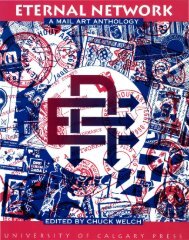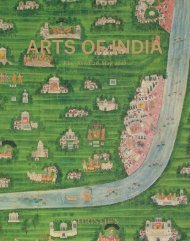1JZGauQ
1JZGauQ
1JZGauQ
Create successful ePaper yourself
Turn your PDF publications into a flip-book with our unique Google optimized e-Paper software.
AN ARCHAEOLOGY OF THE IRON CURTAIN<br />
and I meet with Maria and Antonio in Trieste. When I meet Maria she<br />
brings along her friend Antonio. They are both Italian and in their 40s.<br />
They are both ‘Triestini’ and know the area well as they were brought up<br />
here and they take me to a recreational area near the Slovenian border, on<br />
the Carso/Karst, not too far from the town. Their families have very<br />
different backgrounds and I notice how that has affected how they speak<br />
and think about the border and about Yugoslavia. Maria’s family moved<br />
here before she was born and although she feels a strong connection with<br />
the area she claims not to have the ‘hang ups’ that she suggests Antonio and<br />
many others with a long history connected to the border have. His family<br />
had a large farm in what is now Croatia but after World War II they lost<br />
everything when they left it all behind and moved to Trieste. He remembers<br />
going to visit family in Croatia in the 1960s. “It was about 100 km to get to<br />
the town and we only met three cars. It was so poor in Yugoslavia that they<br />
did not have cars. Also if you drove in the night it was completely black as<br />
there were no streetlights. We brought sugar, spaghetti and coffee with us.<br />
They had nothing” (Maria and Antonio 2008 pers. comm. 5 th September).<br />
Maria’s memories about the border are more connected to crossing it in<br />
order to buy cheaper food or for example jewellery that was a bit different<br />
from what you could buy in Italy. She remembers how their car was always<br />
searched when they crossed the border in order to check how much goods<br />
they were taking with them. After Slovenia’s independence however the<br />
situation changed, she says: “when capitalism came into these places it was<br />
no longer cheap for us, and there were no good things to buy. The shops<br />
were empty so we stopped to go [sic]” (Maria and Antonio 2008 pers.<br />
comm. 5 th September 2008).<br />
Maria’s story, as well as Anja’s mentioned above, is not unusual and<br />
often told on both sides of the border. This demonstrates that as well as<br />
being a divider the border also presented opportunities. People had different<br />
relationships with the border. Often people who were affected by the<br />
border had to work out a way to relate to it. For example when we walk in<br />
the border area of the Carso/Karso, Antonio tells me how people walking<br />
on the Italian side sometimes accidently crossed over into Yugoslavia and<br />
got caught and questioned by the Yugoslavian border police. He starts<br />
laughing and tells me the story of a man who lived near the border here.<br />
One day one of his chickens ran away and crossed the border. The man ran<br />
after him and was arrested by the Yugoslavian police and put in prison for a<br />
while. The fate of the chicken is not explained in the story. Maybe the<br />
Yugoslavian authorities were more tolerant towards animals. Similar stories<br />
112




